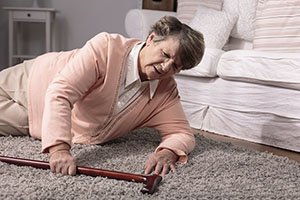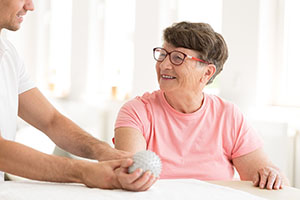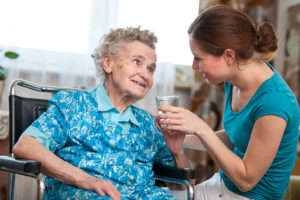Most seniors would prefer to live at home for as long as possible–and you like the idea of having your senior loved one in their home for as long as possible. Unfortunately, living at home can add several increased risks to what your loved one faces every day. If your loved one is still living at home, make sure that both of you fully understand the risks so if the time comes where additional in-home assistance is needed to ensure your loved one’s safety, you are well-prepared for the change. Risk #1: Isolation Many seniors find themselves living home alone after their spouse has passed away. This can leave them isolated from the outside world, especially if they don’t regularly go out with friends or if they’re no longer able to drive. Unfortunately, social isolation doesn’t just impact your mental health. It can also cause a decreased lifespan, a higher risk of heart ailments and an increased risk of physical issues as your loved one ages. Risk #2: Increased Risk of Injuries As seniors age, their risks of falling and other traumatic injuries rise along with them. Poor eyesight, limited mobility and safety hazards throughout the house can make it difficult to safely perform the daily tasks of living. Seniors who live alone are at increased risk of injury, since there’s no one to help take care of those important tasks for them. It’s also important to consider how injuries might be handled if there’s no one in the home to notice and your loved one is unable to call for help. Risk #3: Medications Many seniors discover that their memory is one of the first things to fail them. Sometimes, it’s as simple as walking into a room and forgetting why they’re there. Managing medications properly with poor memory can be an ongoing struggle and frankly, can be very dangerous. Seniors may forget whether or not they’ve taken their medications, leading to over- or under-dosing. This can lead to serious health complications, especially in seniors with significant medical conditions that require regular medication, monitoring and care. Risk #4: Becoming a Target Many scammers have learned that seniors living at home alone are an easier target for their scams. Seniors are more likely to give out financial information over the phone or to respond to a plea for help. Scammers may pretend to be a grandchild or other loved one in trouble in an effort to get seniors to give out personal information, which can then leave them suffering financially. Risk #5: Failing Health Due to Malnutrition Seniors who live at home alone run an increased risk for malnutrition. They may have poor diets, from struggling to remember whether or not they’ve eaten to choosing unhealthy sweets and other meals instead of healthier options. As appetite decreases or problems with chewing increase, seniors may opt to forego meals, which can in turn lead to malnutrition and other serious health problems. Risk #6: Higher Rates of Depression and Anxiety Seniors who live at home alone are at a higher risk to develop depression and anxiety. With too much time to think and not enough interaction with other people, it’s easy to become paranoid or to otherwise struggle with mental health. Depression and anxiety can in turn lead to very physical health problems. Do you have a senior loved one struggling to perform the tasks of daily living safely? Securing home care services can be a huge help and offer you priceless peace of mind. At Elderlink Home Care, we provide surprisingly affordable care for seniors who need assistance with the activities and tasks of daily living. If you or a loved in is in need of assistance, contact us today to learn more about the services we can provide.
Make an Appoinment
LATEST NEWS
“There’s no place like home” is an especially true statement for the elderly or anyone who needs in-home care. Balancing care for a loved one with your own work and family obligations truly represents the phrase, “burning your candle at both ends.” While you think you can do it all, chances are your body and stress level are telling you something different. The myth that in-home care is unaffordable is just that—a myth. Not scheduling in-home care is, in fact, can be costlier due to time away from work, your own health issues, and stress. Let’s get to the facts about in-home care, its affordability and how it can provide you with peace-of-mind – which is priceless! In-Home Care Defined The first step in understanding the financial facts about in-home care is to understanding exactly what home care is. Home care is defined as non-medical assistance in the home with the activities of daily living. Things that we all day each day – but often become harder with age or any kind of illness. In-home care, while most closely associated with the elderly, is also a viable option for those with accident injuries, stroke or post-operative recovery or progressive diseases. Home care involves caregivers coming into the home and assisting with the following: Errands and transportation to appointments Meal planning and preparation Toileting and incontinence care Personal care, such as help with bathing Light housekeeping and laundry Companionship and recreational activities A patient’s needs may change over time due to their condition. At Elderlink Home Care, Inc.we offer a free in-home consultation so that together, we can decide upon the most needed services for your loved one. Affordability Recognizing that your loved one needs more assistance than you can provide is a positive step forward for both of you. The costs for in-home care vary depending on many things, such as the amount of care scheduled and the specific care needs of the person receiving care. While home care is typically private pay, there are some other options to assist with funding: Long term care insurance (Usually in very small amounts) Conducting your own in-home care cost comparison is always a good idea. It’s important to keep in mind that any costs associated with in-home care are still significantly less than the costs of assisted living facilities or nursing homes. Peace of Mind There’s no price tag for the value having peace of mind brings to your soul. Knowing your loved one is receiving quality care in their own home allows you to focus on your family and your job. Many people just like you are facing decisions regarding care for their loved ones, especially for elderly family members. According to data from American Senior Communities, the population of older seniors, people age 85 and older, is expected to reach more than 14 million by the year 2040. One of the primary feelings adult children deal with regarding their aging parents or loved ones is guilt. Guilt is a powerful emotion that pushes us to constantly do more at our own expense. Finding the funds to pay in-home care is an investment into more focused attention for your loved one and more personal time for you. Elderlink Home Care, Inc. With 30 years of experience serving the Denver metro area, Elderlink Home Care, Inc. is an experienced and well-respected home care company. Our caring and professional staff encourages you to schedule a free consultation today. A free consultation is a great way to learn more about the services we offer and how we can help you achieve your ideal outcome. In-home care is surprisingly affordable and we will go over costs in detail. While you may think you can do it all, you must remember that super heroes only exist in the movies. An in-home caregiver provides care for basic needs so that you can focus on spending quality time with your loved one. The time spent reminiscing or having lunch creates great memories. Protect and care for your own health by allowing us to care for your loved one. There truly is no place like home—let us help your loved one stay there; contact us today.
According to the Parkinson’s Foundation, about a million people in the United States (and 10 million people worldwide) are living with Parkinson’s disease, while another 60,000 Americans receive the diagnosis every year. This progressive nervous system disorder is most common in those over age 60, but it can impact younger individuals, as well. If someone in your life suffers from Parkinson’s, you well know the challenges they face with tremors, imbalance, stiffness and coordination. As the disease progresses, these tremors may start to interfere with daily life, and they might face additional symptoms like depression, emotional issues, sleep disorders, trouble eating and incontinence. Securing home care services, becoming a caregiver yourself, or a combination of both options will help your loved one live the highest quality of life possible within the scope of his or her symptoms. The Michael J. Fox Foundation, Caring.com, and Healthline share these suggestions to help offer the best care for your loved one with Parkinson’s: Be There for Medical Visits Your loved one will appreciate the moral support of your presence at the doctor’s office, but it’s also important that you listen carefully and take notes regarding their condition. They may not be able to remember all the details. The doctor may also be able to offer some advice to you as a caregiver. Stay Informed Read as much as you can about Parkinson’s so you understand the disease and what your loved one will go through. You’ll also want to be well-versed about your loved one’s insurance: what type of coverage do they have for prescriptions, therapy and long-term needs? Watch for Changes Parkinson’s doesn’t affect everyone the same way. Some cases progress more quickly than others. Watch your parent or loved one carefully to notice any changes in their movement or behavior as the result of the disease or perhaps as a side effect of certain medications. Always report any changes to their doctor. They might not notice the changes or forget to tell their doctor. Get Organized You’ll need to keep track of medical and therapy appointments as well as prescriptions. Help ensure your parent or loved one is taking all necessary medications on schedule. Listen Allow your loved one to retain as much independence as possible. They may need more help later on but continue to offer what is necessary and welcome. Listen as they talk about their needs and concerns. Chances are, they are also afraid and might appreciate the opportunity to talk about their feelings. Ask for Help It takes a team to care for a loved one with Parkinson’s. Don’t hesitate to ask for help when you need it. This is essential to prevent caregiver burnout. Being the best possible caregiver for your loved one with Parkinson’s means taking care of yourself, too. You may find that some in-home assistance to help with simple tasks such as grocery shopping and errands might provide you with a lot of relief and extra time. You might also consider joining a support group for caregivers. It’s helpful to have the support and advice of people who are experiencing a similar journey. Get Professional Assistance In addition to your loved one, you may also have a career and a family that need your attention. Working with a home care company will allow yourself more time to focus on your loved one with Parkinson’s as well as the other areas of your life. It’s not unusual to feel overwhelmed or stressed caring for a loved one. Be sure to seek help when you need it. Elderlink Home Care, Inc. has been serving the Denver area with home care assistance for over 30 years. We send caregivers into the home to assist you or your loved one with the activities of daily living. Don’t wait until you feel burned out, resentful or overwhelmed caring for your loved one, please contact us to help ensure your loved one is able to age in place with comfort and dignity.
As we get older, certain conditions become much more common. While most of us think of arthritis, muscle pain, or insomnia, one of the more insidious conditions that plague seniors is depression. The only thing worse than how common depression is in seniors, according to the National Institute on Aging, is how hard it can be to manage. While depression can be a struggle, the following tips can help you manage it in your aging loved ones. Tip #1: Look For The Symptoms The first thing you have to do in order to manage depression is to recognize the symptoms in your loved ones. While things like lethargy and distraction may be due to natural aging, there are other, clearer symptoms that should run up red flags when you see them. Things like not eating for extended periods of time, or no longer taking pleasure in activities that once brought them joy. This list of potential symptoms of senior depression from Help Guide is good to keep around. Also, remember, everyone gets sad sometimes. It’s when these symptoms stick around and refuse to go away that you need to start worrying over them. Sadness or feelings of despair Unexplained or aggravated aches and pains Loss of interest in socializing or hobbies Weight loss or loss of appetite Feelings of hopelessness or helplessness Lack of motivation and energy Sleep disturbances (difficulty falling asleep or staying asleep, oversleeping, or daytime sleepiness) Loss of self-worth (worries about being a burden, feelings of worthlessness or self-loathing) Slowed movement or speech Increased use of alcohol or other drugs Fixation on death; thoughts of suicide Memory problems Neglecting personal care (skipping meals, forgetting meds, neglecting personal hygiene) Tip #2: Keep Your Lines of Communication Open Depression is like a weight hanging around your shoulders, and even if you want to reach out to others for help it can feel like a monumental task to do so. That’s why you need to take the initiative, and check-in with your loved one. Not just a casual, “Hey, how are you doing?” either. You need to establish open communication, and to build trust between the two of you. Most importantly, you need to reach for your loved one, and make sure they have support from you. Because on days where things are really bad, they may not be able to reach for you. Tip #3: Let Them Do Things On Their Own It’s an unfortunate truth that the older we get, the more things we can no longer do on our own. Even things we once took for granted, like quickly going up a flight of stairs or driving might be out of reach. However, as anyone who has needed a little assistance to get through the day can tell you, it’s important to still do things for yourself. So, if your loved one is depressed, don’t just complete tasks for them. Instead, support them, and let them do things for themselves. It will give them a sense of accomplishment, instead of feeling like a burden. Tip #4: Create A Sense of Purpose Seniors who don’t have anything to do with themselves can often feel listless and disconnected. This is why so many seniors seek out volunteer work, hobbies, or other activities to keep themselves busy. This sense of purpose can help manage depression, help build community ties, and keep the senior engaged in meaningful ways. There is only so much you can do on your own when it comes to managing an elderly loved one’s depression. While you might be able to handle some days, it’s important to talk with the senior in your life about seeing a professional. Therapists can dedicate time, effort, energy and resources to helping your loved one in ways you might not be able to and they’ll have greater insight into the problems being faced. Not only that, but professionals may be able to find solutions that you and your loved one can both work toward, acting as a trailblazer to help guide you through the tangled jungle that depression can become. In addition, you might want to explore how home care could help ease the load on you and the depression for your loved one. Elderlink Home Care, Inc. can offer a whole range of assistance with activities of daily living. To find out more, simply give us a call.
Elderlink Home Care, Inc. is excited to announce the winner of our ‘Celebrating 30 Years’ grant for July 2018 – Ms. Carole Mitchell. Ms. Mitchell was nominated by her daughter, Ms. Sherri Connell. Ms. Mitchell, 82, was born in Illinois and has lived in Colorado since the early 70’s. She raised 3 children as a single mom with a successful career as a high-end clothing representative, property manager and radio air time sales representative. She has two grandchildren and four great-grandchildren. In the early 2000’s, Ms. Mitchell saw a serious need for a way for single seniors to connect with other single seniors and form friendships; and founded The Breakfast Club. What started out as a small club has grown into an organization with over 700 members and several chapters! Ms. Mitchell is getting ready to move to a new community in mid-August. When asked what she plans to do with the $300 grant, she said the much-needed money will be going toward many moving expenses. Congratulations, Ms. Mitchell!
Unfortunately, scams that target the elderly are all too common. Many scammers are looking to take advantage of elderly individuals: people who are vulnerable or more susceptible to their wiles. By understanding the potential scams out there, you can help protect the elderly people in your life from being victims. The Grandparent Scam In the grandparent scam, a scammer will call and pretend to be a relative. They’ll claim that they’re in trouble in some way, often financially, and that they need immediate assistance. Many scammers will pretend to be a beloved grandchild, begging the grandparent, “Don’t tell Mom and Dad! They’ll be so disappointed in me if they know.” Sometimes, they’ll claim to be in jail and need money for bail; other times, it may be a case of needing money wired to them immediately while they’re traveling. Protecting Your Loved One: Encourage your loved one to always verify information from callers claiming to be relatives. Tell them to insist that they’ll call them back, then check out the story with other relatives. Remind them that none of their grandchildren will ask them to keep a secret if they’re in trouble. The Medicare Card ID Theft Scam Medicare offers a huge advantage for many seniors: free or low-cost medical care. Scammers are well aware of the value of Medicare, and they’ll try to get their hands on seniors’ information. They may claim to be from Medicare or to be from a doctor’s office that needs that information in order to process payment. Protecting Your Loved One: Personal information, including social security numbers, banking information, or Medicare ID information, should never be given over the phone. If you do receive a call from someone claiming to be from an official agency, keep in mind that they’re unlikely to request information from your loved one. Remind them to keep information private and verify who they’re speaking to before handing over any information. The Lottery Scam “Congratulations! You’ve just won…” The lottery. A chance to go on a free cruise. An incredible prize package worth tens of thousands of dollars. There’s just one little catch: before you can claim your prize, you’ll need to make a small deposit, purchase a gift card, or take another key step. Of course, the reality is that there is no prize. Once the deposit is made, the “prize” will disappear, and your loved one may not be able to get their money back. Protecting Your Loved One: Remind your loved one that if they’ve won a legitimate prize, they won’t be asked to provide banking information over the phone–and they certainly won’t be required to pay for the prize. They should also keep in mind that they can’t possibly win something that they haven’t entered. Utility Fraud Many scammers pretend to be from the utility company: water, power, gas, or electricity. They’ll call up warning seniors that their utility is about to be cut off for nonpayment, sending them into a panic. In most cases, seniors will quickly offer payment to avoid this style of retribution. Protecting Your Loved One: Remember, utility companies don’t call to get payment–especially not as a first line of approach. Instead, they’ll typically send letters letting your loved one know that payments are behind. Have them check online or call the utility company directly to verify any problems with payment, rather than simply issuing an immediate payment over the phone. Counterfeit Medications As your loved one ages, the cost of medications increases–and many seniors, as a result, turn to online pharmacies, many of which are based outside of America. There are a lot of counterfeit products out there, including anti-aging products that claim to be able to slow the symptoms of aging. Protecting Your Loved One: Keep an eye on the medications that your loved one is taking. Make sure that they aren’t falling victim to any anti-aging scams or other key problems. Often, protection is as simple as ensuring that their medications are coming from a reputable source. Reverse Mortgage Scams A reverse mortgage will allow your loved one to take out some of the equity they’ve build in their home, allowing them to access funds that they need for medical care, home repairs, and other key things in their lives. Unfortunately, many scammers will simply convince your loved one to transfer home ownership to them without providing them with the funds they need. Protecting Your Loved One: Reverse mortgages can be a very valuable and useful tool for seniors. However, like so many other things, shouldn’t be arranged over the phone. If this is something your loved one wants or needs, encourage them to ask friends, family or trusted advisors for referrals and arrange to visit a physical location instead. Internet Fraud You’re probably familiar with this one. A scammer calls up, insisting that a computer in the home is simply filled with viruses. The scammer will offer free security, a diagnosis, and a repair over the phone. All they need is remote access to the computer–which will then be infected with a slew of viruses. Protecting Your Loved One: Remember, if you haven’t called for tech support, they aren’t going to call you–and Windows isn’t monitoring your machine. Let your loved one know where to receive real tech support and how to deal with it when there is something wrong with their computer. Contractor Scams Over time, repairs do need to be made to your loved one’s home. So-called contractors often take advantage of the elderly, offering services and taking payment, then never showing up to do the work. Not only is your loved one left without the repairs done, they’ve been cheated out of the repairs that actually needed to be performed! Protecting Your Loved One: Always research contractors before hiring them to do work. Make sure that your loved one is protected by a contract. If your loved one is struggling with dementia or no longer seems able to handle what’s going on around them, our Elderlink Home Care,
After a stroke, many people ask the question “What do I do now?” No one expects to have a stroke, and it can be devastating when it happens. Everyone has a different length of recovery, and everyone typically worries about the same things. Whether you or your loved one has suffered a stroke, there are several important things to know about the recovery process. Use Your Primary Doctor Immediately upon leaving the hospital after a stroke, arrangements should be made for the patient to see their primary doctor. The physician will give you invaluable information on how to stay healthy, and ensure proper rehabilitation. He or she will inform you about treatment options, as well as any other specialists that you may need to see. Your primary doctor is one of your best resources in this difficult situation. Reduce the Risk of Additional Strokes The main concern of the stroke survivor and their families is the risk of having repeat strokes. Talk to your diet about diet, exercise, medications, and a course of treatment. Make sure he or she outlines exactly what you need to do, and certainly don’t hesitate to ask questions! If there is anything that you are unclear about, ask for clarification. Ask your doctor for recommendations about what your daily routine should be in terms of reducing the risk of repeat strokes. What Does Recovery Depend Upon? Since no two situations are alike, this varies from person to person. Some people may recover in a few months, while it takes others several years. That being said, the factors that your recovery depends upon are: the percentage of the brain that was affected by the stroke, the course of treatment and rehabilitation that the patient receives, and, most importantly, the motivation of the patient to take the necessary steps toward recovery. Family members need to check in regularly with patients and make sure they are eating healthy, getting proper exercise, and enough sleep. Make sure that the patient is following all of the doctor’s orders exactly in order to make the road to recovery as efficient as possible. The Importance of Repetition Many people, both patients and family members, may not realize just how important repetition is when recovering from a stroke! Neuroplasticity is rebuilt, and the brain is rewired to make new connections. It is vital that the patient not grow frustrated with the process. At times, even simple tasks need to be relearned after suffering from a stroke. The patient will benefit from exercises such as repeatedly lifting a small weight. Ask your doctor which exercises you should be doing on a regular basis that will have the most benefit. Know How Much is Enough While exercise is important after experiencing a stroke, the patient still needs to pace themselves. Light exercises, such as a walk around the block, are highly effective for stroke survivors. The patient should never push themselves to do more than they are comfortable with. If you feel that you need a day to rest, certainly take it. There is no benefit in overdoing it, so have realistic expectations of what you should or should not do. Recovery is Possible Positive thinking is of utmost importance after a stroke. Patients and family members should never make comparisons between two or more people. Remember, every stroke is different, and each patient will have different needs. Never give up or get discouraged. Family Support is Vital for Stroke Survivors Survivors need to know that they have family members that they can depend upon. Having a sense of security for personal needs is important in a person’s recovery. The best thing you can do for a loved one who has suffered a stroke is to be there for them as much as possible. At Elderlink Home Care, Inc. we understand the stress that stroke recovery can put on the survivor and his or her family. We can help ease the stress on both the family and the stroke survivor by placing caregivers into the home to provide assistance with the activities of daily living. We can lighten the load for everyone involved. If we can help, contact us today, or call us at (303) 734-0641.
Let’s face it. As your loved ones age, they will usually need help and assistance. And so often, their grown children already have huge demands on their time. So expecting them to provide all the care needed is not really feasible. However, our aging loved ones are often very resistant to accepting that they need a caregiver or personal aide. This can then cause frustration and tension on all sides. If you have an aging parent relative who needs in-home help, then it can be hard to work out how to approach them and how to convince them that they (and you) need the extra assistance. Here are some things to consider: 1. Choose the right time. Right after a holiday or another stressful event is often a poor time to broach the issue, even if it might be the time you realize that more help is definitely needed. Choose a time when you are both relaxed. Consider inviting them over for dinner and then bringing it up afterwards, when everyone is calm. Be ready to table the discussion and bring it up multiple times, or to delay the discussion until another time if tensions are high. 2. Suggest a trial period. If your loved one is worried about loss of independence or privacy, a trial period can help allay their fears. And, of course, a trial period will make sure that the right kind of help has really been selected and allow them to talk to several caregivers and find somebody they are comfortable with. 3. Communicate. Nobody wants to feel that a solution is being pushed on them from outside. Start by finding out why your loved one is having issues – is it fear of their privacy being invaded? Pride? Loss of independence? Grief? In some cases, accepting help after the loss of one’s long-term partner can be particularly difficult. Discovering the reason for the resistance is the first step to helping work through it. Your solutions should involve the elderly person as an active partner, even (and perhaps especially) if they are experiencing the first stages of cognitive decline. 4. Stress the positive. A home caregiver can be the best way for your parent to keep their independence. Bring up things that they used to do and cannot do any more. Are they starting to get embarrassed by the state of their yard? Do they wish they could still read books, but are finding it hard to get audio or large print versions of what they enjoy? An aide can also be a way to continue to visit museums, go to the movies, or take walks. 5. Make it about the help you need, not just them. Many people will be resistant to accept help for themselves, but far more willing to accept it on behalf of others. If you explain that the time you are spending on them is interfering with your work, marriage, or the things you really need to do, then they may be more willing to accept outside help. Dealing with a loved one who needs extra help can be a challenge. You need to accept that they can still make their own choices and not push care on them unless there are immediate safety issues involved. However, getting them to be willing to accept home care can help reduce family tensions, free up your life, and allow them to age in place for longer. When they are ready to accept help and you have discussed their needs with them, contact Elderlink Home Care or call us at 303-734-0641. We offer custom in-home care for specific needs. Our caregivers provide assistance in personal matters and on outings for shopping or leisure, and we will match your relative with the perfect caregiver for their unique situation.









